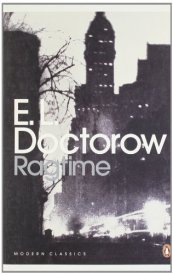In response to SFG's request for thoughts on his books, I read Ragtime earlier this year, and here is what I posted on it elsewhere.
Doctorow is a writer I've been meaning to get into for ages. Because of the subject matter of his most famous novel,
Ragtime - the early twentieth century in all its glory and goriness - I tend to think of him as a classic of yesteryear, when in fact he's still writing keenly and published his latest novel
The March just a month or two back. Indeed
Ragtime dates from as recently (ie within my lifetime) as 1974, though I never got around to picking up a copy until the irresistible new Penguin Modern Classics edition came out last month.

And it's a spectacularly unexpected read, almost literal in its metaphorical structure (dense, colliding, messed up, as the years he wishes to present to us), and quite untraditional in terms of normal storytelling. Instead Doctorow takes famous figures like Harry Houdini, Henry Ford, President Taft, J.P. Morgan, and dumps them in his literary blender and mixes them up not only with one another but with a fictional family without names - Mother, Father, Mother's Younger Brother, and so on - to highly impressive effect.
The result is not as difficult and trying as he might imply in the epigraph
"Do not play this piece fast. It is never right to play Ragtime fast..." - Scott Joplin (who also appears as a character in the book)
but it is dense and thriving with much more life per page than most modern fiction. Only in the second half of the book does a unifying plot come in, with the (fictional?) figure of Coalhouse Walker, a black man who begins a terrorist campaign against the city authorities after members of the fire department pimp his ride in all the wrong ways (by laying a turd on the back seat and slashing the roof). This brings the novel to a rather more traditional conclusion and runs a real risk of making it rather more pageturning that Scott Joplin would like. But what does he know? He died three-quarters of the way through.





